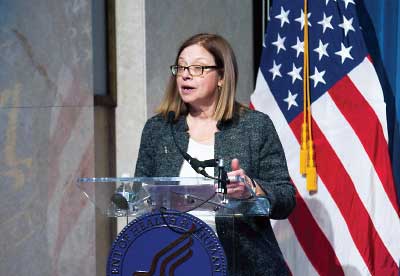The Substance Abuse and Mental Health Services Administration (SAMHSA) is taking a new approach to addressing serious mental illness (SMI), with a renewed focus on evidence-based, collaborative care and reliance on community resource providers, such as peer support specialists, according to Elinore F. McCance-Katz, M.D., Ph.D., assistant secretary for mental health and substance use in the Department of Health and Human Services.
Mental illness, including substance use disorders, affects more than 64 million Americans every year. “Never in the history of this country has there been a time of greater need for attention to these issues,” McCance-Katz wrote last month in Psychiatric Services in Advance. “We are in the grip of an opioid crisis characterized by addiction and death such as we have never seen. Too often affecting our young people, the consequences of untreated mental illness and addiction have been tragic, frequently associated with violence and death.”
Other initiatives by SAMHSA include prioritizing the training of health care practitioners to provide evidence-based treatment, working toward providing free national technical assistance and training, and funding innovative programs to combat the opioid epidemic, McCance-Katz wrote.
The agency’s new approach to SMI will be supported by the Interdepartmental Serious Mental Illness Coordinating Committee (ISMICC), a public-federal partnership aimed at improving services for adults and youth living with SMI. The agency will focus on mental health court programs, assisted outpatient treatment (known as AOT, or court-supervised community treatment), assertive community treatment teams, and expanding its successful certified community behavioral health clinics—now established in eight states—that provide integrated services as well as crisis care.
As part of the effort to build a national system of free or low-cost practical training and technical assistance available to any organization or practitioner, SAMHSA created the national Clinical Support System for Serious Mental Illness (CSS-SMI) and chose APA as the grantee to implement the program. It will provide training, webinars, and classroom-style training on evidence-based approaches to serious mental illness, including pharmacotherapy, use of clozapine for treatment-resistant schizophrenia, use of long-acting antipsychotics, and ways to address metabolic syndrome.
The agency is also planning to help expand suicide prevention programs. One of these programs is Zero Suicide, which trains health care professionals on how to ask about suicidality and make safety plans to get people into care. In 2016, more than 45,000 Americans died by suicide, a 30 percent increase over the past 15 years.
The agency is continuing to fund innovative programs to address the epidemic of opioid abuse and will use its 2018 funding boost to expand efforts with a proven track record of success. These initiatives include drug courts, programs for pregnant and postpartum women with opioid use disorder, naloxone distribution and training, peer specialist training, and minority fellowship funding for physicians and psychologists working with patients with substance use disorder. SAMHSA will also, for the first time, provide funding to educate physicians, physician assistants, and nurse practitioners so they can provide office-based buprenorphine treatment.
“These are important times for establishing new models that will use evidence-based care to manage the needs of Americans experiencing serious mental illness and substance use disorders,” McCance-Katz wrote. “SAMHSA will play a key role in establishing these new care approaches and in preparing the behavioral workforce.” ■
“McCance-Katz Leads Effort to Focus SAMHSA on Serious Mental Illness” can be accessed
here. More information about APA’s grant to expand care for those with serious mental illness is available
here.

